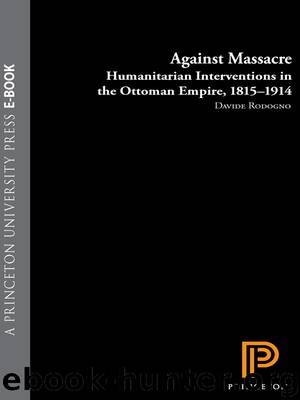Against Massacre by Rodogno Davide

Author:Rodogno, Davide
Language: eng
Format: epub
Publisher: Princeton University Press
At the beginning of the twentieth century, British foreign policy was changing rapidly. Canada, Australia, New Zealand, and South Africa became independent dominions. During the first decade of the century Great Britain reached an agreement for the defense of British interests in the Nile valley and settled its colonial dispute with France. The Franco-British Entente Cordiale of 1904 was a turning point in European relations and in some respects a prelude to the Anglo-Russian rapprochement. In 1906 British capital was involved in a loan to Russia for the first time since the Crimean War. In August 1907 Russian fears of a German-dominated Baghdad railway were decisive, leading Russia and Britain to settle their colonial disputes in Persia, Afghanistan, and Tibet and to agree on the territorial integrity of the Ottoman Empire. By 1908 it was clear that a collective intervention on behalf of Ottoman Christians was unlikely to happen and that the unilateral intervention of one of the European powers would probably have led to a general war.
The year 1908 marked the beginning of the Young Turks revolution in the Ottoman Empire. Opposition to the sultan had been forced underground or abroad, coalescing around those who had been in Paris since the suspension of the constitution of 1877, known as the Young Turks from their journal La Jeune Turquie. As the Committee for Union and Progress (CUP), in 1902 they had held a first congress of various groups, including Turks, Albanians, Kurds, Greeks, Armenians, and Jews, united by their wish to remove the sultan, restore the constitution, and save the Ottoman Empire from foreign interference. It was precisely the humiliation and frustration of the foreign powers in Macedonia that eventually precipitated the 1908 coup. Bad harvests in Anatolia put pressure on the European provinces as Kosovo was hit by drought. Shortages directed Albanian unrest against towns and Slav peasants. Rumors that the Austrian Army was coming coincided with troops being withdrawn to deal with mutinies further south and caused concentrations of armed Albanians, which the CUP enlisted. The Young Turks argued that a return to the constitution would dissuade further foreign intervention as more members of the military in Macedonia expressed sympathy for them and their political ideas. The Young turks believed in their mission to create a modern state based on an Ottoman consciousness. Shortly after the July Revolution, a Parliament was called to represent all the Ottoman provinces, including Bosnia-Herzegovina and Eastern Rumelia. In October, to ward off the reassertion of Ottoman claims, Bulgaria declared independence and Austria-Hungary formally annexed Bosnia-Herzegovina. In the meantime, the intervention of the foreign powers in Macedonia was interrupted and Russo-Austrian rivalry was revived in the Balkans.29
In 1909 the sultan's supporters attempted a countermove in Constantinople, which the CUP put down. Abdul Hamid was deposed, imprisoned in Salonica, and replaced with his brother Mehmed V. The question, as Pavlowitch puts it, “was no longer how to reform the Empire, but how to save the state. The gap grew between official Ottoman policy based on constitutional guarantees, and actual CUP practice.
Download
This site does not store any files on its server. We only index and link to content provided by other sites. Please contact the content providers to delete copyright contents if any and email us, we'll remove relevant links or contents immediately.
| Arms Control | Diplomacy |
| Security | Trades & Tariffs |
| Treaties | African |
| Asian | Australian & Oceanian |
| Canadian | Caribbean & Latin American |
| European | Middle Eastern |
| Russian & Former Soviet Union |
The Secret History by Donna Tartt(19088)
The Social Justice Warrior Handbook by Lisa De Pasquale(12190)
Thirteen Reasons Why by Jay Asher(8909)
This Is How You Lose Her by Junot Diaz(6886)
Weapons of Math Destruction by Cathy O'Neil(6279)
Zero to One by Peter Thiel(5802)
Beartown by Fredrik Backman(5754)
The Myth of the Strong Leader by Archie Brown(5507)
The Fire Next Time by James Baldwin(5444)
How Democracies Die by Steven Levitsky & Daniel Ziblatt(5218)
Promise Me, Dad by Joe Biden(5153)
Stone's Rules by Roger Stone(5088)
A Higher Loyalty: Truth, Lies, and Leadership by James Comey(4963)
100 Deadly Skills by Clint Emerson(4925)
Rise and Kill First by Ronen Bergman(4788)
Secrecy World by Jake Bernstein(4753)
The David Icke Guide to the Global Conspiracy (and how to end it) by David Icke(4718)
The Farm by Tom Rob Smith(4509)
The Doomsday Machine by Daniel Ellsberg(4490)
